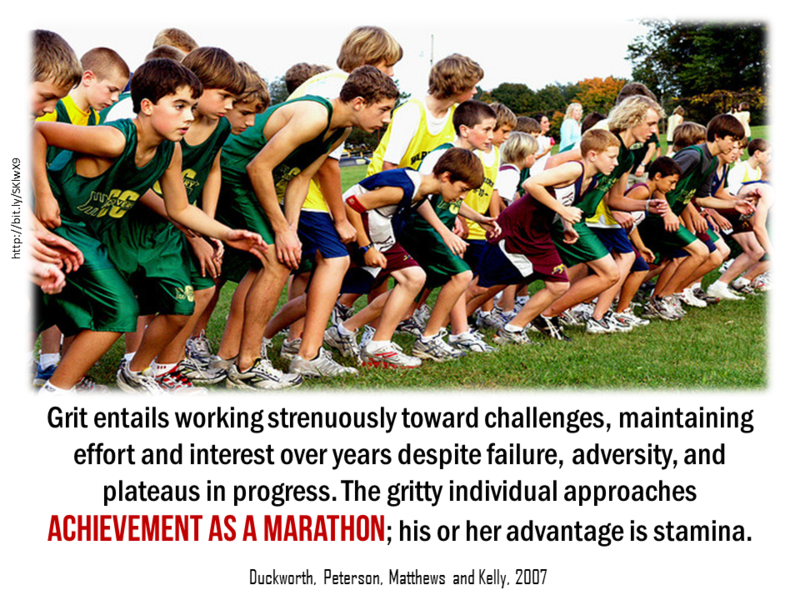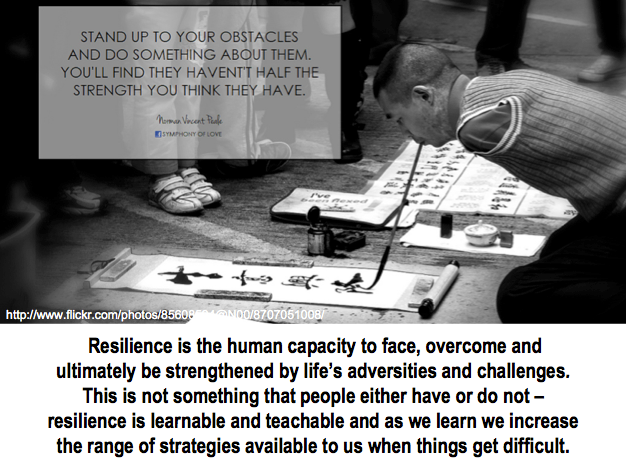How can we best prepare children and adolescents to thrive in the 21st century? This question is at the heart of what every educator attempts to do on a daily basis. Apart from imparting content of knowledge and facts, however, it’s becoming clear that the “noncognitive competencies” known as grit, perseverance, and tenacity are just as important, if not more so, in preparing kids to be self-sufficient and successful. -- source
And adults too? Grit as a non cognitive competency --- have educators given serious thought to this? And if we haven't should we? And doesn't grit and resilience apply to our learning too?
I've been thinking on that for a bit ---with five tabs open in my browser that I keep coming back to. And I've been reflecting upon this past year during which I supported coaches in PLP's Connected Learner Experience as they in turn supported learners in becoming more self directed in their own professional learning. One tab, Break Down, Rebuild, Start Fresh speaks to professional learning. However, most of tabs (DRAFT: Promoting Grit, Tenacity, and Perseverance—Critical Factors for Success in the 21st Century; How to Foster Grit, Tenacity and Perseverance: An Educator’s Guide; Resilience: The Other 21st Century Skills; Grit: The Other 21st Century Skills) are about students being successful as 21st century learners. And I'm feeling they apply to educator professional learning too.
In her post on Grit which included the Duckworth video, Jackie Gerstein captures the essence of grit:
and the essence of resilience here:
In her post, she goes on to quote:
What if just a few words were altered?"In many cases, particularly with unfamiliar material, educators need to engage students in activities that bridge from their interests and familiar experiences to the learning objectives to help students attain more complex learning goals." (Promoting Grit, Tenacity, and Perseverance—Critical Factors for Success)
In many cases, particularly with unfamiliar material,Isn't that similar to this?educatorscoaches need to engagestudentseducators in activities that bridge from their interests and familiar experiences to the learning objectives to helpstudentsthem attain more complex learning goals.
Your role as a connected coach will be to deepen the learning experience for those you coach. You will be the bridge from the theory they are hearing to practical application applied in their own personal contexts. Self directed learning is a connection activity. It requires connection to the content and context, to oneself, and to those who are part of the learning community, community of inquiry and the network. (Nussbaum-Beach and Ritter Hall)And this-- a disposition we've (Sheryl and I) valued for both connected learners and Connected Coaches:
Perseverance toward deep thought by exploring ideas and concepts, rethinking, revising, and continual repacking and unpacking, resisting urges to finish prematurelyPerhaps there is a need to be more specific, to dig deeper with coaches and other connected learners than "perseverance". For I am convinced-- grit and resilience are non cognitive competencies we as learners (and coaches) need too! So I'm thinking on additional ways that I might support coaches in the coming year-- I'm going to look more closely at the USDOE paper and draw and adapt what may be appropriate for adult learners in creating an environment that enables others to embrace their own grit and resilience. And encourage coaches to be mindful of that also. A work in progress here as I reflect, read, and think some more.
As Sheryl has exhorted recently:
We’ve let circumstance define who we are and draw boundaries for us that are unnecessary. The means to bring about real shift — to resolve the issues that stand in the way of powerful learning and powerful practice — are found within the collective, collaborative mindset we have inside us.My sense is grit and resilience are a big parts of that mindset she references-- as we each become more self directed in our learning.
Taking the posture of a learner first, educator second requires us to understand that we will never arrive at the place of “super educator.” The truth is that even if we solve the problems facing us as a profession, the solutions will only give way to new problems. Now more than ever we need to become the learners we have always wanted our students to be.
Grit and resilience-- competencies, dispositions even more relevant for 21st century adult learners --I'm wondering if it's time for thinking deep on our own strategies and making them more visible to our colleagues and our students?

